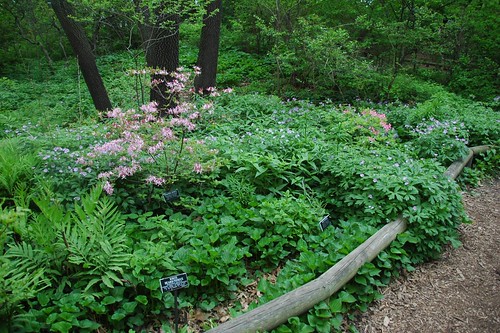See also The Osborne Garden and The Bluebell Wood.
For the past four years I’ve been cultivating my backyard native plant garden. I’ve been adding compost and mulching with leaves and shredded Christmas trees, as much as I can get of all of it. I’m not yet able to grow The Precious (below), but I’m learning in Soil Management class that what I’ve been doing is just what’s needed to develop the humusy, woodland soil it requires. Someday, I’ll have some in my garden (obtained, of course, only from a conservation-oriented source such as the Vermont Ladyslipper Company). Meanwhile I can enjoy them in BBG’s Native Flora Garden.
Cypripedium calceolus var. pubescens, Yellow Lady-Slipper
I find the native Lady-Slipper orchids achingly beautiful. They seem more to float than to be held up by their slender stems. Maybe they would seem less fantastic if they were more common, spreading like dandelions, and less specialized in their environmental requirements. Maybe, but not by much.
There are other beauties in bloom right now. The early Spring wildflowers have been replaced by the regime of those which bloom in late Spring, and even early Summer. Geranium maculatum is one example of something I associate more with Summer than Spring. It is, in some settings I’ve seen, a common wildflower. But I covet it for my own garden nonetheless.
Geranium maculatum

Some of the Spring ephemerals are already entering senescence. Here’s Dicentra cucullaria Dutchman’s Breeches, as it appeared Tuesday afternoon in one part of the Garden. Contrast that with how it appeared just three weeks ago in a different location.
Dicentra cucullaria, Tuesday afternoon
Dicentra cucullaria, three weeks earlier
Spring ephemeral describes a life habit of perennial woodland wildflowers which develop aerial parts (i.e. stems, leaves, and flowers) of the plant early each spring and then quickly bloom, go to seed and then quickly die back to its underground parts (i.e. roots, rhizomes, and bulbs) for the remainder of the year. This strategy is very common in herbaceous communities of deciduous forests as it allows small herbaceous plants to take advantage of the high amount of sunlight reaching the forest floor prior to the leaf-out of woody plants.
– Wikipedia: Ephemeral plant
It’s interesting that Wikipedia lists Dicentra eximia among the Spring ephemerals. It’s still going strong at BBG. My experience is that it blooms for months, and lasts at least through the summer, barring drought. This is one of the things that makes it an excellent performer in the garden.
Tuesday afternoon, near the Bog habitat
Interspersed with Dodecathon meadia in the Serpentine Rock habitat
The march of the Rhododendron in the Osborne Garden continues into the Native Flora Garden, more evidence that early Summer is replacing late Spring.
Rhododendron prinophyllum, Rosebud Azalea
Rhododendron periclymenoides, Pinkster Azalea
Two purple beauties from the Pine Barrens habitat, something which I would only be able to recreate in container in my garden.
Viola brittoniana, Coast Violet
Lupinus perennis, Sundial Lupine
[bit.ly]
Related Content
Native Flora Garden, Brooklyn Botanic Garden, 2009-04-27
Native Flora Garden, BBG, 2008-04-18
Photos from Tuesday (Flickr photo set)
All my photos (Flickr collection)
More on native plants
Wildflower Week in NYC, 5/1 through 5/9, 2009-04-29
Growing a Native Plant Garden in a Flatbush Backyard, 2007-08-06
Resources: Native Alternatives to Invasive Plants, 2007-05-22
Native Plant profile: Dicentra eximia, Bleeding-heart, 2006-05-22
Notes from a visit to the Brooklyn Botanic Garden, Late July 2005



Really lovely photographs…
Wow, what beautiful woodland plantings. Thanks for walking us through it. Cheers!
Your blog and pictures make me ache. I am a transplanted New Yorker who has been in Pasadena for 11 years. I lived in NJ for 13 years and had a garden with some native plants and lots of large oak trees. Seeing your pictures reminds me of it. I now garden with CA natives, and really love it here, but your blog has made me a bit homesick. I appreciate the sense of place in your garden – it is definitely something I try to capture here.